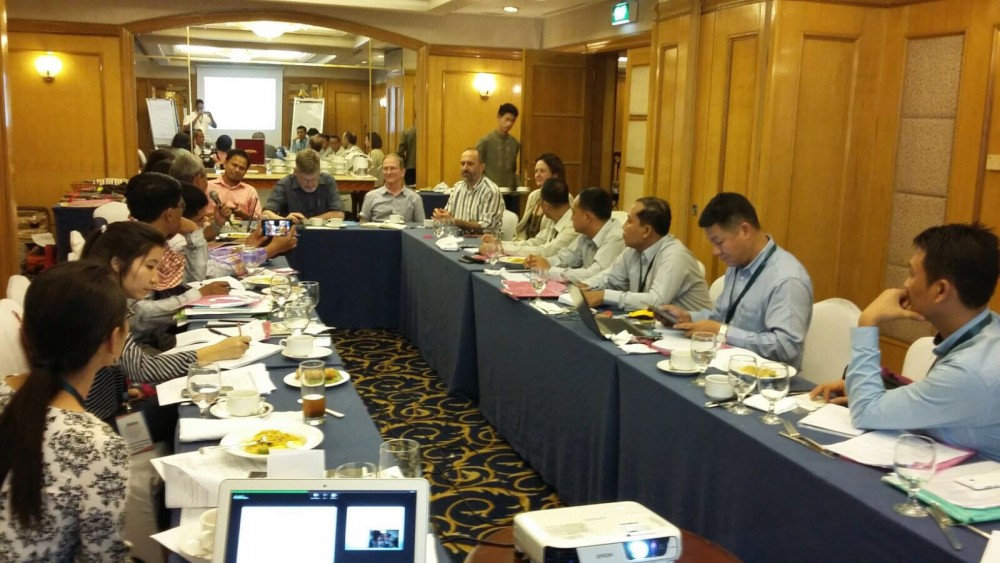Philippine Government, MILF share peacebuilding experiences with Myanmar group
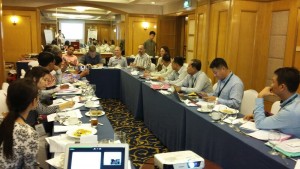
The Myanmar JMC team was met by all members of the Third Party Monitoring Team (TMPT) of the Government of the Philippines-MILF peace process, headed by Former EU Ambassador Allistair McDonald. (Manila Dec 13, 2015)
The Centre for Peace & Conflict Studies (CPCS) organised an exposure visit to Manila and Cotabato in Philippines from December 12-18, 2015 for 10 members of the Myanmar Joint Monitoring Committee (JMC), one of the peace infrastructures created after the signing of the Nationwide Ceasefire Agreement in October 2015.
Four high-ranking officials from the Myanmar armed forces, the Tatmadaw, two representatives from civil society, a member of the Democratic Karen Buddhist Army (DKBA), a member of the Chin National Front (CNF) technical working group, and two members from the Myanmar Peace Process (MPC) participated in the visit to learn from the peacebuilding experiences of the Government of the Philippines and the Moro-Islamic Liberation Front (MILF).
The trip was the first of its kind to include both members of the Tatmadaw and representatives from Myanmar ethnic armed organisations.
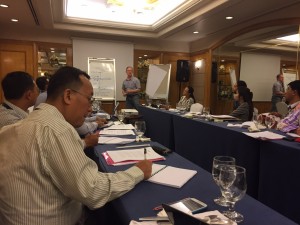
Steve Rood, member of the TMPT and Director of The Asia Foundation, discusses the normalisation process. (Manila, Dec 13)
Sharing lessons learned
Key issues discussed over the course of the trip included disarmament, demobilisation, and reintegration and security sector reform, particularly in regards to socioeconomic support for soldiers when integrating back to civilian life and the time frame of their rehabilitation.
Members of the JMC explored the Philippine roadmap to peace and the normalisation process with the Third Party Monitoring Team (TPMT), a body tasked with monitoring the implementation of the ceasefire agreement between the Philippine Government and the MILF.
Throughout the trip, examples were shared regarding how communities at the grassroots level have been able to help maintain ceasefires and prevent escalations of violence.
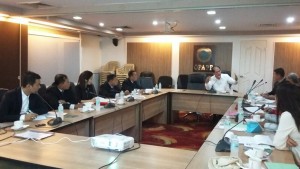
The JMC team spoke with both sides of the Philippine Government-MILF Peace Panel. Mr. Mohagher Iqbal, Chairman of MILF Peace Panel, shared his experiences regarding conducting negotiations for over a decade. Sec. Senen Bacani, a member of the government peace panel, conferred with the JMC team at the Office of the Presidential Adviser for the Peace Process (OPAPP). (Manila Dec 14)
During meetings with both government and MILF representatives, ideas were exchanged on issues such as mechanisms for dealing with ceasefire violations, and negotiating particular aspects of agreements like ancestral domain, socioeconomic development and rehabilitation.
Case studies were presented on rebuilding trust and confidence between the military and the community, redeployment of armed forces into the security field, transitional justice and reconciliation, and the role of civil society organisations and international actors in the Philippine peace process.
Shifting attitudes
The peace process between the MILF and the Government of the Philippines is one of the most stable and mature in the region and has been ongoing for 17 years. Though not without flaws, the Philippines’ peace process is the most accessible example of a military that is positively engaged in building peace with non-state armed groups.
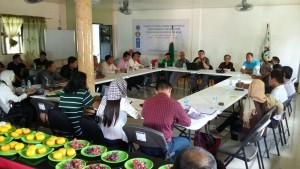
The JMC visited Camp Darapanan, the headquarters of the MILF. They were met by a team of MILF members headed by the Chief of Staff of the Bangsamoro Islamic Armed Forces (BIAF), the armed wing of MILF, together with current and former members of the Central Committee, peace panel and the Committee on the Coordination on the Cessation of Hostilities (CCCH). (Maguindanao, Dec16)
As such, the Philippines presents an ideal learning context for people involved in the Myanmar peace process. One of the main aims of the exposure visit was to create peer-learning opportunities that could help facilitate shifting attitudes and perceptions among key stakeholders about “what works” in transforming violent conflicts.
Participants in the visit had the opportunity to visit peace panels from both negotiating parties, explore ceasefire mechanism structures and meet civil society organisations that work to support the peace process in Mindanao. These diverse stakeholders, representing the government, military, armed groups, communities in the Philippines and international actors provided participants with broad perspectives on various aspects of the country’s peace process.

